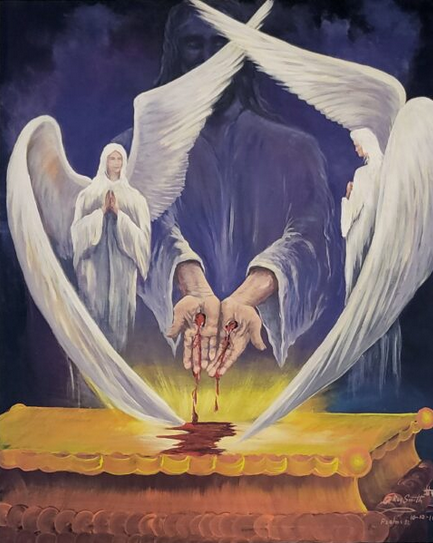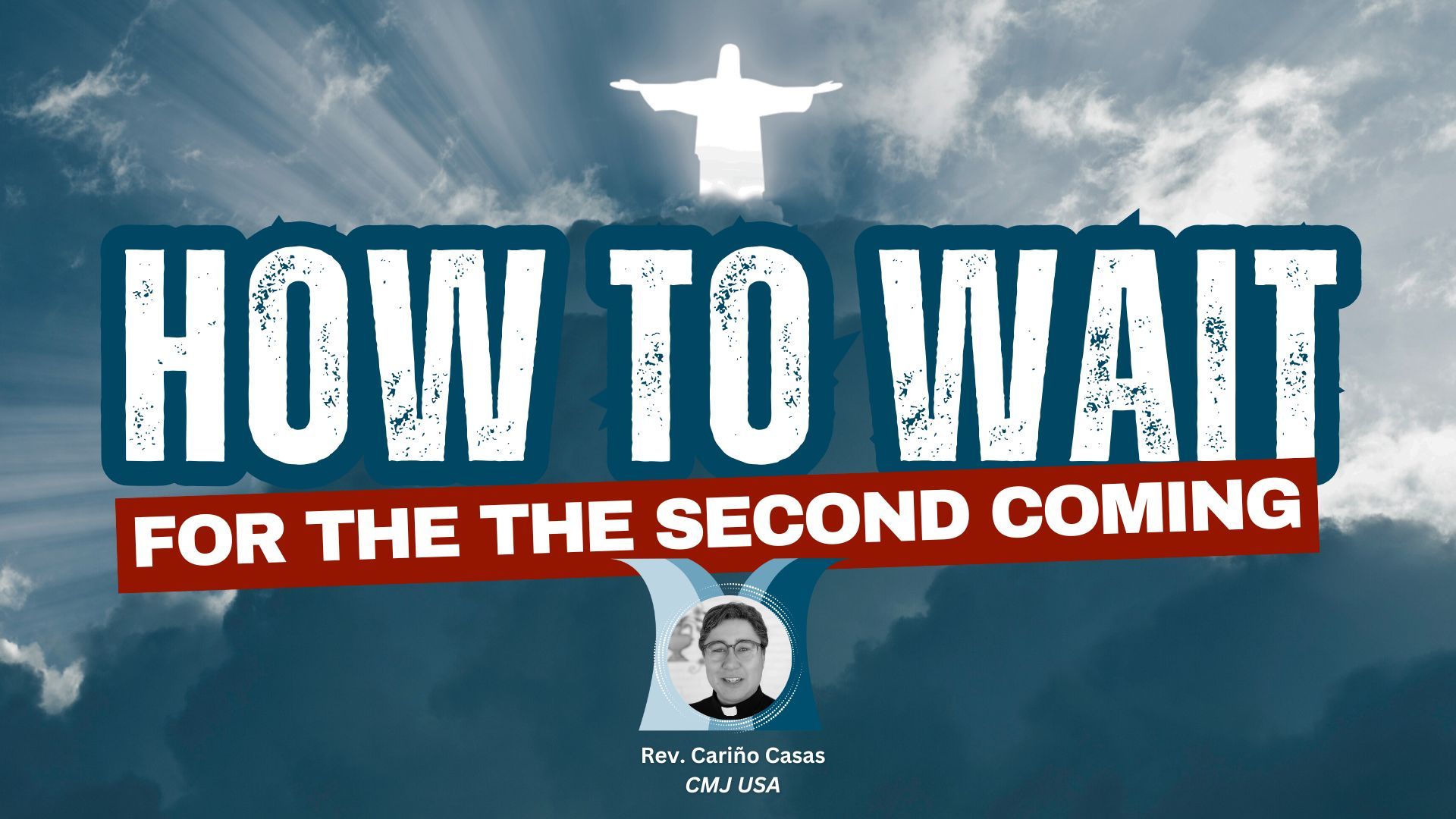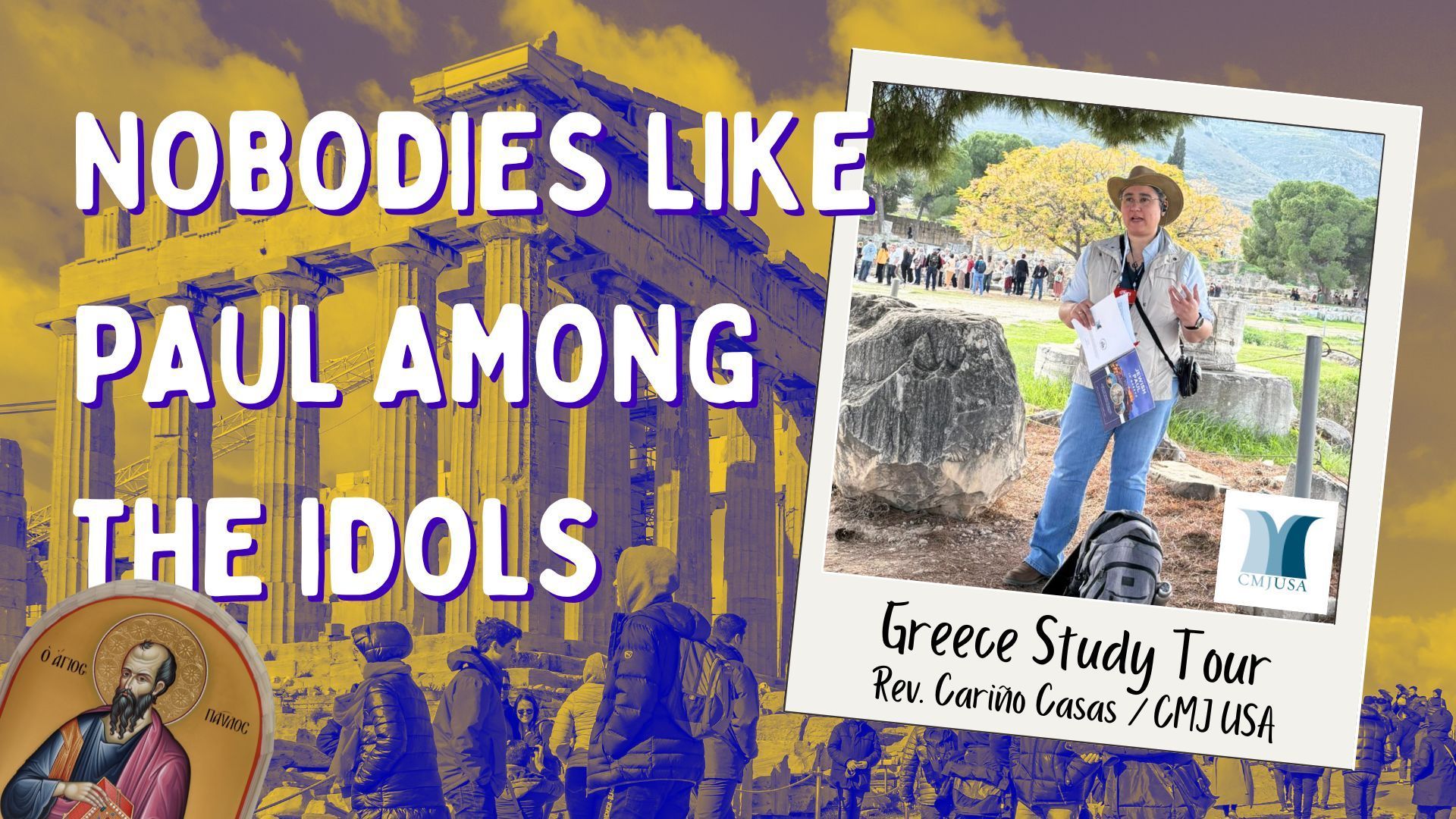The Creator God is merciful. Answer his trumpet call
By Rev. Cariño Casas
Executive Director
Rosh Hashanah II / 16th Sunday after Pentecost
Sirach 27:30–28:7
Psalm 103
Romans 14:5–12
Matthew 18:21–35
Shalom, friends.
Today is the second day of Rosh Hashanah, called in the Bible the Day of Blasting, the Day of Shouting, the Day of Making Noise.
So let us shout to our God.
Hallelujah! (Hallelujah!)
Hosanna! (Hosanna!)
Lord save us! (Lord save us!)
Praise the Lord! (Praise the LORD!)
If you are new to this church, you may be wondering why I’m talking about a Jewish holiday? I think the regulars here are used to this. The Apostle Paul anticipates your question in our reading from Romans 14.
5 One person esteems one day as better than another, while another esteems all days alike. Each one should be fully convinced in his own mind. 6 The one who observes the day, observes it in honor of the Lord. … 10 Why do you pass judgment on your brother or sister? Or you, why do you despise your brother? For we will all stand before the judgment seat of God.
Paul was writing to the church in Rome, a congregation made up of Jews and Gentiles who were struggling to reconcile different cultures and calendars. In another place, he urges the spiritually strong to have grace for the spiritually weak. So I am asking you to have mercy on me, your weaker sister, who finds joy and spiritual depth in the Jewishness of the Gospel of Christ.
So, what is Rosh Hashana? What is Yom Teruah, Hebrew for the Day of Blasting, or Feast of Trumpets, as some call it?
Leviticus 23 says it is a memorial. For what?
The first mention of the shofar is in Exodus 19, when God comes down on Mount Sinai to make covenant with the newly freed Hebrews. The shofar blast told the people it was safe to approach the holy mountain and to meet the LORD. So perhaps it’s a memorial for that covenant-making day.
There are seven holy days of the LORD in Leviticus 23, eight if we count Shabbat. There are Passover, Feast of Unleavened Bread, Feast of First Fruits, Shavuot or Pentecost, Day of Blasting, Yom Kippur, and Feast of Tabernacles. These are appointed times to meet the LORD. Do they point to something?
As followers of Jesus the Messiah in 2023, we have nearly 2,000 years of hindsight to help us along. Looking back, we see that Jesus’ redeeming work on the cross and his resurrection happened exactly on the first three feasts. At the Last Supper, better said his Last Passover Seder, Jesus said his body is bread, not just any bread but unleavened bread, leaven being a metaphor for sin. Jesus is free from the sin that plagues us. Jesus was crucified and buried as Passover lambs were being slaughtered in the Jerusalem temple. He rose from the grave on the Feast of First Fruits, which is why Paul says Jesus is the first fruit of the resurrection (1 Cor 15).
Then, the promised Comforter, the Holy Spirit, was poured out on the Feast of Shavuot, what the Greek-speaking Jews called Pentecost. That’s four out of seven Leviticus 23 holy days marking pivotal moments in the lives of Jesus and his followers.
Perhaps we need to pay attention to the last three holidays – Day of Trumpets, Day of Atonement, and Feast of Tabernacles. The New Testament ties trumpet blasts to Jesus’ return and the final resurrection (For those who want to chew on that later, see Matt 24:31, 1 Cor 15:52, 1 Thess 4:16). Today we’ll touch on the Day of Trumpets and on the Day of Atonement.
On Rosh Hashana, our Jewish neighbors stop to remember the creation of the world. This is when they commemorate God forming all we see and making humanity in his image. It’s the Universe’s birthday – Happy birthday, Universe!
It is good to remember that the Eternal God without beginning or end started this Universe. It doesn’t matter if you believe in the Big Bang or that all this was made in seven literal days. The point is that there was a beginning that we did not engineer. Something outside of us made all this. That makes God the King of the Universe. It is good to stop and bow down in reverence.
This is why this morning’s psalm is so perfect for Rosh Hashana. When the Christian and Jewish calendars intersect this beautifully, I know the Holy Spirit is guiding both.
Earlier we said that Rosh Hashana is known biblically as Yom Teruah, the Day of Blasting. The sound of the shofar is meant to call us to attention ten days before Yom Kippur. The Day of Atonement is when the whole of Israel would come before the LORD in repentance of all the sins of the past year. The High Priest would enter God’s throne room in the Tabernacle or Temple and plead for mercy on behalf of the whole nation, sprinkling the blood of the atoning sacrifice on the Ark of the Covenant. God, in his mercy, would hear, and the whole camp was made clean so that God could continue to dwell among his people.
Psalm 103 reminds us that God’s character is to always have mercy and that he longs to dwell with us and makes a way for him to be always among us. It starts with a doxology, fancy word for a praise about God. Then it tells us why we should praise him, by listing his benefits to those who follow him. It continues by describing God and listing what he’s like. Then it says what humans are like and how we are not like God at all. Then it closes with another doxology, calling all creation in heaven and earth to praise God the Creator.
So let’s walk through this psalm together and be reminded of God’s mercy and goodness.
1 Praise the Lᴏʀᴅ, O my soul, *
and all that is within me, praise his holy Name.
2 Praise the Lᴏʀᴅ, O my soul, *
and forget not all his benefits:
When we said this psalm earlier, we used the version from the Book of Common Prayer. But most translations say “Bless the LORD,” more reflective of the Hebrew verb barakh. We find it strange to say that we bless the LORD, because we think of blessing as having to do with benefits. We struggle with that concept in the Beatitudes, too. “Blessed are the poor in spirit” or the persecuted or those who mourn, Jesus says. It’s hard to see blessing there because we think of blessing as material. But blessing in a Hebraic sense has more to do with relationship than with nice things.
That’s why some translations will say “praise the LORD” or “thank the LORD.” The idea is that we reaffirm our relationship with God. We bless him by acknowledging he exists, acknowledging that we are created beings and he is the Creator.
The psalmist calls us to bless God because, yes, there are benefits that God blesses us with. While blessing isn’t necessarily about benefits, God does show his relationship with us by extending benefits to us. God is the one …
3 who forgives all your iniquity,
who heals all your diseases,
4 who redeems your life from the pit,
who crowns you with steadfast love and mercy,
5 who satisfies you with good
so that your youth is renewed like the eagle's.
6 The Lord works righteousness
and justice for all who are oppressed.
There is this wrong teaching that has run through the church that God in the “Old Testament,” the Hebrew Scriptures, is mean and vengeful and that God somehow changes in the New Testament or, worse, that Jesus is a different, more merciful God.
Yet, here in the middle of the Hebrew Psalter, is a description of Israel’s God saying that he is
- Forgiving
- Healer
- Redeemer
- Loving
- Merciful
- Giver of good things to refresh our strength
- Justice-giver to the oppressed.
I have certainly experienced all this from God. If you haven’t, we’ll get to how you get into God’s benefits plan later.
The psalmist continues describing God.
7 He showed his ways to Moses, *
his works to the children of Israel.
8 The Lᴏʀᴅ is full of compassion and mercy, *
long-suffering and of great goodness.
Where the creation event established God’s kingship over all the universe, the Exodus displayed to Israel and all the nations God’s character to always have mercy and to hear the call of the oppressed.
If you are a regular reader of the Psalms and of the Prophets, notice how many times the Exodus story comes up. God and those worshipping God or speaking for God continually remember or call the people to remember God’s powerful intervention in freeing the enslaved Israelites from Egypt.
Yes, God was hard on the Egyptians. But every plague was a call for Pharoah to repent from unjustly oppressing the Hebrew slaves. God wanted to show Egypt mercy, but Pharoah would not relent. Don’t think God unjustly hardened Pharoah’s heart. God only confirmed and sealed Pharoah’s unmoving heart. Pharoah was not moved with any compassion on his slaves. He thought only of himself, his power, his people. So God heard the voice of the oppressed Israelites and freed them in movie-worthy fashion.
The Egyptians didn’t miss this, either. If you read closely in Exodus, you will see that many Egyptians left Egypt with Moses and the Israelites. They saw in the plagues God’s awesome power on behalf of the oppressed, the downcast, and the poor. The community of Israel in the wilderness was already made up of Israelites AND Gentiles.
God describes himself as The Merciful One to Moses directly. In Exodus 34, Moses asked to see God’s glory, a bold request.
As God passes by, shielding Moses in a mountain crevice, he says, “The Lord , the Lord , a God merciful and gracious, slow to anger, and abounding in steadfast love and faithfulness, 7 keeping steadfast love for thousands, forgiving iniquity and transgression and sin, but who will by no means clear the guilty.” (Exod 34:6-7). (read again)
The psalmist has an answer for that last part, about God not clearing the guilty.
9 He will not always chide us, *
neither will he keep his anger for ever.
10 He has not dealt with us according to our sins, *
nor rewarded us according to our wickedness.
11 For as the heavens are high above the earth, *
so great is his mercy also toward those who fear him.
12 As far as the east is from the west, *
so far has he set our sins from us.
13 As a father pities his own children, *
so is the Lᴏʀᴅ merciful to those who fear him.
14 For he knows whereof we are made; *
he remembers that we are but dust.
The psalmist knows we are all guilty. All, and I do mean all of us, have sinned and come short of God’s glory. But God has made a way for us to be cleansed. The shofar is calling us to that cleansing, to that outpouring of mercy.
I know in this time in our society, verse 13 is hard: “As a father pities his own children, so is the LORD merciful to those who fear/respect/reverence him.” The psalmist has in mind a good father, but many around us and perhaps some of us have not had good fathers. You in fact may have had a horrible, abusive, vindictive father. That is a failure of that particular man, and maybe of our society, to not emulate the Heavenly Father, the Father of Fathers. God does pity us. He remembers we are fragile flesh and bone. Our bodies break, we bleed, our hearts break, we weep, we hunger and thirst, we die. He is THE Good Father waiting to see you appear on the horizon so he can run to you. God wants to run to you, sinner in need of forgiving.
As I said, we die. We have a limited time on this earth. What is it all for? For us to learn what Adam and Eve initially missed: God is trustworthy. The brokenness in this world is not his doing. It is ours. God never wanted all this pain and hurt to enter his creation. We did that when we thought of ourselves instead of Those around us.
And so the wind blows and we turn back into ashes and dust.
17 But the merciful goodness of the Lᴏʀᴅ endures
for ever and ever upon those who fear him, *
and his righteousness upon children’s children,
18 Even upon those who keep his covenant *
and think upon his commandments to do them.
19 The Lᴏʀᴅ has prepared his throne in heaven, *
and his kingdom rules over all.
What are God’s commandments? They can be distilled into two imperatives: love God and love your neighbor. We heard them at the start of the service.
How do we love God? We bless his name. We trust him when he says he forgives us. And we follow the second commandment, we love our neighbors.
How do we love our neighbors? We imitate how God loves us: we forgive, we heal, we give good gifts, we encourage, we work justice for the oppressed.
We are now in the Ten Days of Awe, a season of repentance. The shofar blast reminds us that God is coming to evaluate us and see if we make the cut. But none of us make the cut. We all have sinned (and don’t think this is a New Testament idea. When Paul says all have sinned and fall short of the glory of God, he is building on Psalms 14 and 53, among others). So really, the ten days are a time to ask for God’s mercy. It is also a time to give and receive mercy from those around us.
You may have noticed when we read today’s Bible passages, we read from perhaps an unfamiliar book: Ben Sira or Ecclesiasticus. This was written by a Jesus before Jesus of Nazareth. Yeshua son of Sira was a Jewish scribe and teacher almost 200 years before Jesus the Messiah was born. Ben Sira is not considered canonical Bible, but we read books like Ben Sira because they help us understand the Jewish mind in Jesus’ day. There may have not been a canonical prophetic word for 400 years, but God was speaking to pious Jews as they prayerfully studied the Scriptures.
Ben Sira warns against unforgiveness, asking how we can expect forgiveness from God when we withhold forgiveness from those who have sinned against us.
2 Forgive your neighbor the wrong he has done,
and then your sins will be pardoned when you pray.
3 Does anyone harbor anger against another
and expect healing from the Lord?
4 If people have no mercy toward those like themselves,
can they then seek pardon for their own sins? (Sirach 28:2-4)
Jesus of Nazareth, in our Gospel passage, says the same thing but with an illustrative story. A man owned his boss millions of dollars. He begged for mercy and was forgiven. But then the man runs into a co-worker who owes him $100. The man physically attacks his co-worker over $100 and presses criminal charges … over $100 dollars! The boss heard about this great injustice, this amazing lack of mercy, and restored the millions of dollars in debt to the first man.
So it is with us. So it is with me. If the LORD has forgiven me every lie I’ve ever told, every arrogant thought, or selfish action, but I can’t forgive the guy who cut me off as I was driving here, then I have no forgiveness from God. My lack of forgiveness shows my lack of 1) personal awareness 2) gratitude for God’s great mercy.
As we approach Yom Kippur and ask God to forgive our sins, we must look inside. Whom do I need to forgive? Where do I need to ask God to heal my broken heart where offense caused trauma?
Forgiveness is not a free pass. It doesn’t mean that I pretend that I wasn’t really sinned against. Forgiveness is acknowledging that someone sinned against you and deciding not to take vengeance. Instead, you trust God that he will enact justice on your behalf. And friends, sometimes, when the offense is between Christians, or the sinner later becomes a Christian, we must know that the justice for that offense you experienced is worked out in Jesus’ death on the cross just as your healing is also in the cross of Christ.
That brings us to how you get into God’s benefits plan. The premium has always been repentance. Since the Garden of Eden, all God has required is that we own up to our own failures. Repentance and trust. Trust that God is good and merciful like he says he is.
A scholar named Chad Bird recently put it like this:
Psalm 86:5 says, “‘For you, O Lord, are good and forgiving, abounding in steadfast love to all who call upon you.’ [God is] good. Not okay, not satisfactory, but good. … Goodness defines his entire being and character. And he is … ready and willing to forgive. He needs no arm-twisting or boot-licking to get him in the mood to be merciful to sinners. As a fish is eager for water and a bird for flight, so our Lord is excited to forgive us for the sake of Christ. Finally, he is … large in love, abounding in divine grace.”

God demonstrates that large love and divine grace when he comes down in the person of Jesus Messiah and becomes the Yom Kippur sacrifice for us. We said earlier that Jesus is the Passover lamb. But the writer of Hebrews makes clear that Jesus is also the Yom Kippur sacrifice. It is Jesus’ blood sprinkled on the heavenly Ark of the Covenant, as that painting over there shows, that makes us clean (Hebrews 9).
As we move from the celebration of Rosh Hashana to the contemplative Ten Days of Awe, let us renew our repentant hearts toward God and toward each other. If this is new to you, if you’ve never confessed and repented your sins before God, Fr. Phil and others here are ready to help you approach our merciful God.
20 O praise the Lᴏʀᴅ, you angels of his, you that excel in strength, *
you that fulfill his commandment, and hearken unto the voice of his words.
21 O praise the Lᴏʀᴅ, all you his hosts, *
you servants of his that do his pleasure.
22 O speak good of the Lᴏʀᴅ, all you works of his, in all places of his dominion; *
praise the Lᴏʀᴅ, O my soul.
Let us shout again to our merciful God.
Hallelujah! (Hallelujah!)
Hosanna! (Hosanna!)
Lord save us! (Lord save us!)
Praise the Lord! (Praise the LORD!)
Amen.
Footnotes
- “ Yom Teruah, the Feast of Trumpets (Shofar): Pay Attention! ” ONE FOR ISRAEL Ministry , 14 September 2020.
- Kent Harold Richards, “Bless/Blessing,” The Anchor Yale Bible Dictionary (New York: Doubleday, 1992) 753ff.
- Jason C. Kuo, “Sirach, Book of,” The Lexham Bible Dictionary (Bellingham, WA: Lexham Press, 2016).
- Chad Bird (@birdchadlouis), “ Abounding in Steadfast Love ”, X (Formerly Twitter) , 15 Sept 2023.
Blessed by this post? Ready to sow into the work of CMJ? No gift is too small. we are blessed by your partnership.



